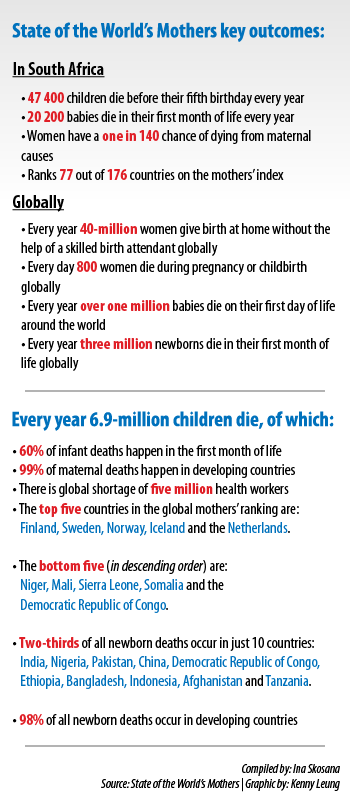A baby in sub-Saharan Africa is seven times more likely to die on its first day of life than anywhere else in the world, according to the latest State of the World's Mothers report. The report, which is produced by the children's rights organisation, Save the Children, says of the world's one million babies dying on their first day, 400 000 are from sub-Saharan Africa. A baby's birth day is considered the most dangerous for both the mother and her newborn child.
According to the report, the Democratic Republic of Congo is the worst place to be a mother, while Finland is the best. South Africa ranked as 77th on a list of 176 countries after the Ukraine, Algeria and El Salvador. Namibia ranked at 121, Botswana 116 and Swaziland at 119.
The reports states that 7 500 South African babies die on their first day of life every year and 20 200 by the first month. Almost 47 000 children don't live to their fifth birthday.

Though a change in calculation methods makes it difficult to compare this year's rankings to those of previous years, Kate Kerber from Save the Children said South Africa is slowly making progress with maternal and under five mortality rates. "Child mortality in South Africa has improved significantly over the past five years, but deaths during the first month of life have not improved," said Kerber. "The day of birth is still dangerous and not much has changed over the past decade."
According to the University of Cape Town's Children's Institute, the country's under- five mortality was 80 per 1 000 births between 2003 and 2005. The latest health department figures show that this had improved to 56 per 1 000 births in 2011.
Kerber said most maternal and infant deaths can be prevented by improved access to quality healthcare for pregnant women and their babies. She said that increased attention to cost-effective, life-saving interventions such as antenatal steroid injections to help premature babies' lungs develop and resuscitation for babies who do not breathe at birth could help decrease the number of deaths during childbirth and the first week of life.
Inequalities
However, the organisation warned that the country figures published in the report may mask inequalities within countries. "There is a drastic difference in the care received in the private healthcare system as opposed to public healthcare," said Kerber.
Only eight million of the 52-million people in South Africa have access to private healthcare, leaving more than 80% of the country's population dependent on the state for basic healthcare.
Senior researcher with social justice organisation Section27 Sha'ista Goga said that government's introduction of health reforms, such as the upgrading of health facilities and recruitment of health workers in preparation for the provision of universal healthcare through the Nnational Hhealth Iinsurance scheme, has the potential to bridge this inequality gap. "It [NHI] can address various inequalities, like funding and quality in underserved areas," said Goga.
She said the establishment of District Clinical Specialist Teams – roving medical teams with a nurse, a gynaecologist and advanced midwife, and other specialists, that service specific health districts – is a step in the right direction. The establishment of the Office of the Health Standards Ccompliance is also a "positive move towards ensuring that the medical care people receive is of a good quality because it will help government identify where the inequalities are, what form they take and therefore allow them to address them", Goga said.
According to Goga, the Sschool Hhealth Pprogramme that the government introduced in October last year, where learners can access health services at school, will address the issue of parents failing to take their children to clinics due to a lack of transport.
However, Goga warned that quality healthcare depends on more than the health department and said that intergovernmental cooperation is still lacking. "Improved access to quality healthcare facilities will assist in increasing equity. But other government departments also play an important role in improving healthcare outcomes. We still have a long way to go," said Goga.